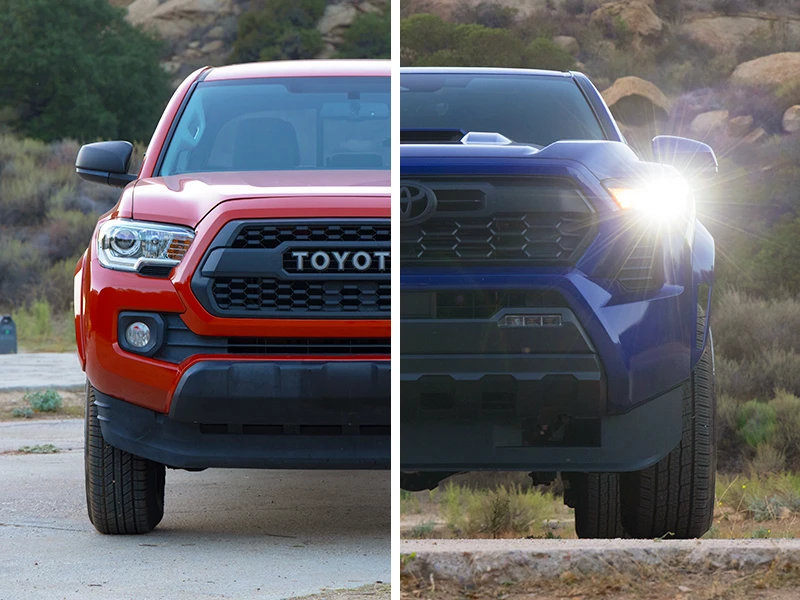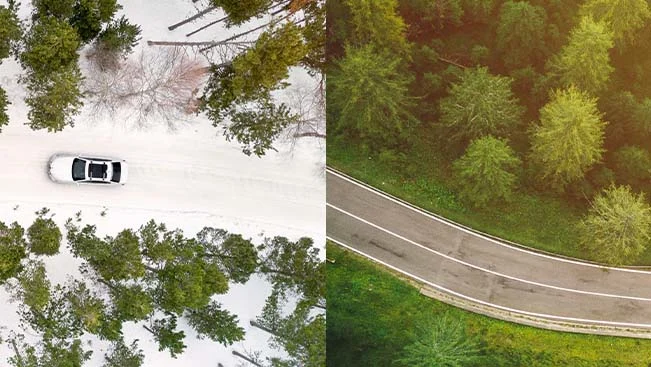
Use this list to get ready for winter.
Article Summary:
Your car needs maintenance during the colder months just as much as in warmer weather.
Car parts to check include your tire pressure, cabin air filter, thermostat, battery, fluid levels and belts and hoses.
We cover what kinds of wiper blades to buy, what should be in your emergency kit, and a DIY de-icer mixture for frosty mornings.
When cooler weather comes, so does leaf-peeping, football, and pumpkin spice everything. For many, the fall and winter months also mean holiday vacations with friends and family. But as the temperature drops, road conditions change and this means your car may need some extra care to get you there.
Prepping your car – inside and out – for winter weather is the best way to make sure your travels are stress-free. Take some time to understand your car and how it behaves on wintry roads, too. A manual transmission will be very different from an automatic, and you may have a useful snow mode, depending on the model of your car. Whether you're a car guru or don't know where to begin, read on for our list of 13 tips to help winterize your car.
1. Wash It
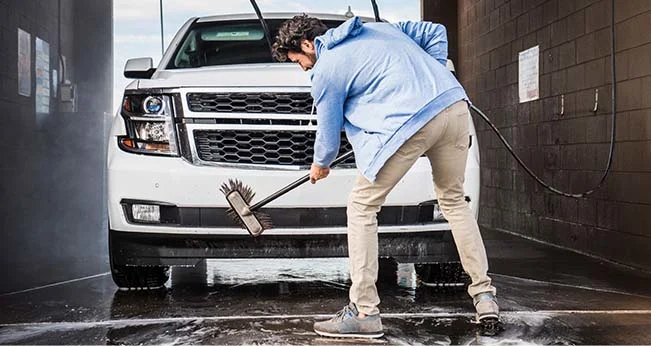
No matter what the season, it's always nice to have a clean, shiny car. This is even more important in the colder months. Rain, snow, and road salt can do a number on your vehicle's paint. They can even build up in certain areas and lead to rust.
How you clean off road grime and natural buildup is up to you—the important thing is to make sure it gets done. An automatic car wash will remove the bulk of the gunk that keeps your vehicle from shining its brightest. Deluxe packages will even focus some of their cleaning power on your undercarriage, wheels, and tires.
If you choose to wash your vehicle yourself, be sure to use a dedicated car wash soap (dish soap is too harsh) and two buckets. Put grit guards at the bottom of both buckets so you don't grind dirt or sand into your car's finish. Fill one bucket with soap and water, and fill the other with only water. Dip a scratch-free microfiber wash mitt into the first bucket and start washing.
Whenever the mitt gets dirty, rinse it in the bucket filled with just water to minimize the chances of transferring grit onto your car's paint job. To remove stubborn contaminants like sap or bug guts, use a detailing spray to lubricate the area, then make a few passes over it with a clay bar. And don't forget to spray off the parts of your car that are harder to see, like the insides of your wheel wells. The undercarriage is especially important because your car's suspension, exhaust, and other components are down there and exposed to the elements.
Bonus tip: Pay particular attention to your headlights. They can't perform their vital job to the best of their ability if they're clouded over. Consider getting a headlight restoration kit and putting in a little elbow grease to remove unsightly haze.
2. Protect the Paint
This step is just as important as washing your vehicle. The more you protect your paint, the better it will look and the longer it will last. Whether you go through a hands-free car wash or choose the DIY route, you can guard your vehicle's paint with a coat of spray wax. There are also a variety of ceramic coatings on the market if you want to go to the next level.
You can even get your entire car's bodywork coated with clear paint protection film (PPF) that guards against stone chips and other blemishes. Unless you already know how to apply it or you're willing to learn by trial and error, we recommend having a professional do it for you.
3. Replace the Wiper Blades

It's essential to keep your windshield clean. After all, how are you going to get to your in-laws' house for homemade pie and board games if you can't see 10 feet down the road? One of the easiest ways to keep your outward visibility crystal clear is to toss out your old wipers for a fresh pair that won't make unpleasant noises or leave streaks on your windshield.
You can even get wipers tailored to the kind of weather you expect to drive through. Anticipating a lot of snow during your travels? Opt for a pair of wipers with their own heating elements. They'll be a great addition to a vehicle with a heated windshield and/or heated mirrors. Just know that they require a little installation work.
If heavy rain is in the forecast, choose wipers treated with a hydrophobic agent. After they swipe across your clean windshield a few times, they leave a coating that will bead up water on contact, making your new wipers twice as effective against downpours.
4. Switch to Snow Tires
Want to turn your Jeep Grand Cherokee, GMC Terrain, or Ford Escape into a more capable winter warrior? Equip it with a fresh set of snow tires. Their softer rubber compound stays flexible in cold weather and helps them grip the road better. They also have special tread patterns with wider grooves that can quickly expel water and snow to enhance traction in slippery conditions. Just remember to hold on to your old tires so you can switch back to them once spring comes.
5. Check the Tire Pressure
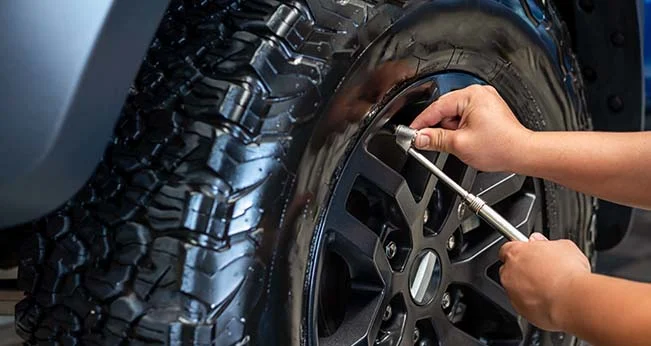
Colder weather doesn't just present potentially hazardous road conditions—it also affects your tires before you even hit the road. For every 10-degree drop in temperature (Fahrenheit), your tire pressure goes down by one pound per square inch (psi). That's why you need to keep your tire gauge handy, especially if your car doesn't have a tire pressure monitoring system that tells you each tire's psi. Better yet, get a portable air compressor you can plug into one of your vehicle's 12-volt outlets in case you need to pump up one of your tires. Some compressors even let you set a psi level, and they shut off once the tire hits that mark.
6. De-Ice Exterior Glass with This DIY Mixture
Boiling water is great for a lot of things: tea, pasta, hot cocoa, but it's not a great idea for defrosting your windshield and windows. In fact, it's terrible for your car in general because it may cause your windshield to crack or even foul up your locks and/or power window controls.
Go easy on your vehicle by spraying your windshield and side glass with a mixture of one part water and three parts vinegar. The vinegar's acidity will prevent ice and frost from building up to an unmanageable level and will make it easier to remove with an ice scraper. Plus, you won't have to worry about burning yourself.
7. Prepare an Emergency Kit
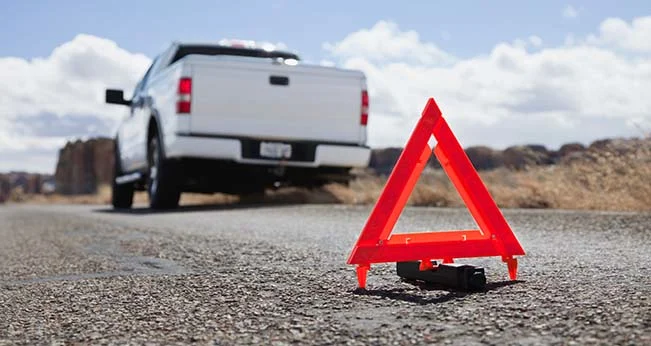
Sometimes, no matter how much you prepare, something goes wrong that's beyond your control and leaves you stranded. You can make that unpleasant situation a little more bearable with a strategically packed emergency kit. Before you set out for that big family get-together, be sure you have the following gear on board:
Jumper cables
Tire pressure gauge
Tire inflator
Tire patch kit
Ice scraper and brush
Gloves
Blankets
Drinking water and snacks
Flashlight
Triangle reflector kit
Road flares
First aid kit
Cell phone
Phone charger
If you have the room, it doesn't hurt to bring some kitty litter or even traction pads to give your tires a little extra grip over slick terrain, especially if you plan on going off-road in an all-wheel or four-wheel-drive vehicle.
8. Check the Cabin Air Filter
There are a lot of downsides to not changing your cabin air filter regularly. A dirty one can cause your HVAC system to perform poorly, slow down window defogging, and fail to screen out airborne contaminants and allergens. On top of all that, a cabin air filter that's past its change date can produce a musty odor that gets pumped right into your face. For easier breathing and more defrost power, change your cabin air filter at its recommended intervals.
9. Check the Thermostat
Keep your cool by making sure your car's interior can heat up. The thermostat sits between the engine and radiator. When coolant passes through the engine, it picks up excess heat. It then passes through the radiator to cool off before circulating through the engine again. If your car's thermostat has worn out, it can prevent the cabin from getting warm and even cause serious engine damage.
10. Check the Battery

You may like the snow, but your car's battery doesn't. It performs best when the temperature is a balmy 80 degrees Fahrenheit. Cold weather makes it work even harder to help start your car. If it's been a while since you got a new battery, take a look at the one under your hood. If the connections are corroded or it looks misshapen—or you notice electrical issues or a slow-starting engine—it's time to replace your battery.
11. Read Your Fluid Levels and Inspect Your AWD/4WD System
Your car can't run on hot apple cider and eggnog (good news: more for you!). It needs oil, coolant, and other vital fluids, and they need changing at regular intervals to get you to that ugly sweater party. Either check and replace them yourself or let a mechanic you trust get their hands dirty doing it.
Be sure to include your vehicle's drive system and its differential(s) as part of that comprehensive checkup. If it's equipped with all-wheel drive like the 2017-2020 Subaru Impreza or four-wheel drive like the 2017-2020 Ford F-150, it has extra parts that need to stay lubricated. One great way of keeping those systems in shape is to use them. If you haven't thrown your 2017-2020 Chevrolet Tahoe Z71 into 4LO since last year, drop it down into gear and head toward something steep and rocky.
12. Use Antifreeze Appropriately
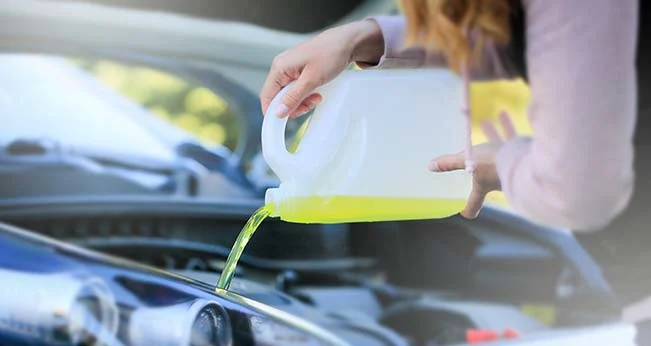
Antifreeze doesn't keep the water in your engine from freezing. However, it does lower the temperature at which the water can freeze. Those fluids work together as equal partners to keep your engine running in frigid conditions, which means a good general ratio to use when you're topping off for cold weather is one part water and one part undiluted antifreeze.
13. Check Your Vehicle's Belts and Hoses
It's hard to enjoy your road trip playlist if there's a loud screeching noise or waves of steam coming from your engine. Before the holiday TV specials hit the air, inspect your vehicle's engine belts and hoses for any cracks or looseness. If you find any, replace the faulty part with a new one. The long drive to that awesome weekend cabin will be a lot more enjoyable for everyone if you're singing along to the music instead of grumbling about how long the tow truck driver is taking to arrive.
Winter is tough on cars and trucks. But with a little work, you can make sure your vehicle is ready to tackle whatever the season sends its way.
Want to learn more about vehicles that handle winter weather with ease? Check out these articles:
